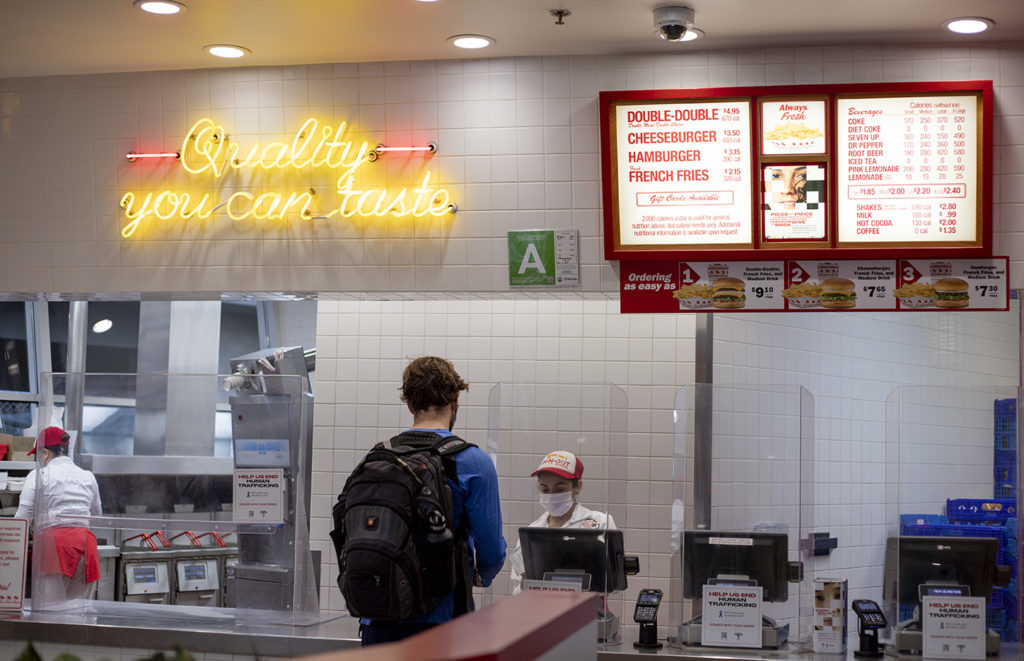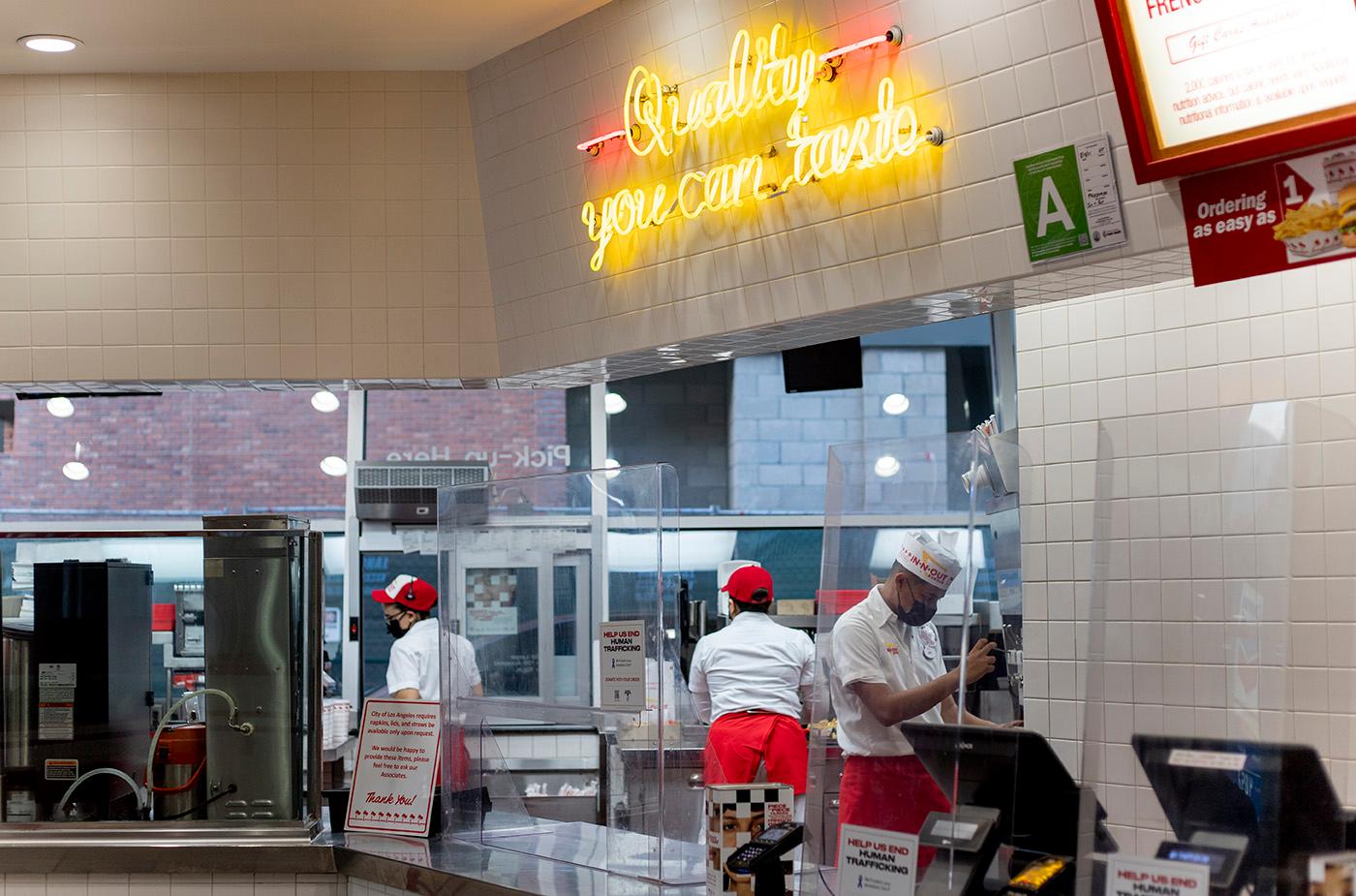UC researchers explore poor conditions faced by workers in fast-food industry
Employees work in the kitchen at an In-N-Out in Westwood. Workers in the fast-food industry had higher risks of contracting COVID-19 compared to the rest of Los Angeles County, UCLA and UC Berkeley researchers found. (Kaiya Pomeroy-Tso/Daily Bruin senior staff)
By Caroline Sha
Jan. 29, 2022 11:45 a.m.
A recent report from UCLA researchers and UC Berkeley researchers analyzed the lack of protections for fast-food workers during the COVID-19 pandemic among other issues.
The researchers began the study after Los Angeles County and the Los Angeles County Board of Supervisors requested a study on working conditions in fast-food establishments within the county, said Kevin Riley, a researcher for the study.
The research was also conducted in conjunction with the Service Employees International Union, he added. According to the SEIU website, the SEIU represents a variety of workers, including fast-food workers.
The results of surveys posted on social media indicated that fast-food workers had a disproportionately greater rate of infection for COVID-19, said Monica Macias, a research analyst at the UCLA Labor Center. While the case rate for Los Angeles County residents was around 15% at the time of the research, 25% of fast-food workers who took the survey said that they had contracted COVID-19 and 50% reported having known a co-worker who had gotten the disease.
Fast-food workers often did not have mechanisms in place to protect them from COVID-19, Macias said.
For example, more than half of fast-food workers surveyed were not notified when they were exposed to COVID-19 in the workplace, Macias said. This means that when a co-worker or multiple co-workers contracted COVID-19, these workers were not informed of the fact or were even lied to about it, she said.
Workers also reported that they had difficulty obtaining masks and cleaning supplies from their place of employment and found themselves in workplaces that were often too small to properly social distance in, said Riley, director of the UCLA Labor Occupational Safety and Health Program, one of the organizations involved in creating the report.
The study also found that workers also faced COVID-19 related harassment from customers, Riley said.
53% of workers surveyed experienced negative interactions with customers when they asked them for compliance with COVID-19 regulations, Macias said. This not only included verbal abuse but also physical altercations as well, she said.
This statistic is independent of the non-pandemic-related violence that fast-food workers reported facing, Macias added. According to the survey, 37% of respondents indicated that they had experienced harassment, such as being called slurs and events of robbery in their place of work, she said.

When workers tried to change the conditions they faced during the pandemic, many faced retaliation, Macias said. Of the questionnaire respondents, 30% reported that they had gone on strike and 25% of those who had gone on strike said that they faced retaliation for doing so.
The reason why fast-food workers had a higher rate of infection is partially due to the economic conditions many fast-food workers face, Riley said.
Fast-food workers are usually low-wage workers and often do not have access to reliable health care, Riley said. In addition, California’s existing sick leave policies expired in September, meaning that some workers chose to continue working while sick due to the fact that they would lose a paycheck if they were to take time off.
The researchers also determined through an analysis of government data and previous studies that fast-food workers were on average Latino, female and young, said Ken Jacobs, a researcher on the study and chair of the UC Berkeley Labor Center, one of the organizations involved with the creation of the report. On average, fast food workers made 40% of their family’s income and two-thirds of the families of fast-food workers participated in safety net programs, he said.
Riley also said that many fast-food workers are young people of color and immigrants and these demographic groups statistically are more likely to live with others, Riley said. In addition, fast food workers may also ride public transit to work, which means they are often surrounded by many different people, he said.
The franchise model of fast-food restaurants also provides unique challenges in keeping workers safe from COVID-19, Riley said.
While fast-food restaurants may have a large corporate name attached to them, they are actually run by franchise owners, meaning that these establishments are not provided many resources by corporations to ensure the safety of their workers, Riley said. While there are franchise owners who may deliberately deny adequate protection, some franchise owners may simply not make enough profit to purchase good personal protective equipment, he said.
The franchise model also leads to an increased prevalence of other labor issues, including wage theft and health and safety violations, Jacobs said.
The reports’ authors also conducted interviews with fast-food workers about their experiences working during the pandemic.
In the press briefing for the report, Lizzett Aguilar, a fast-food worker at McDonald’s in Los Angeles, said that she was fired when she voiced complaints about the COVID-19 violations she experienced in her workplace. She said that while fast-food companies make billions in profits, fast-food workers are forced to work multiple jobs and participate in public assistance programs just to survive in addition to what they are experiencing now.
In order to combat these risks, Macias said more businesses should enforce COVID-19 safety protocols and ensure workers who do bring to light COVID-19 safety violations are safe from retaliation. She added that policymakers must also work to pass measures that protect workers from pre-existing labor violations such as discrimination and wage theft.
[Related: Students share their experiences of being essential workers in grocery stores]
One of the major potential policies to combat labor violations is Assembly Bill 257, which will establish a labor standards board that would include seats for fast food workers themselves, Jacobs said.
Jacobs said that, if passed, the bill would allow the created board to set labor standards as well as hold fast-food companies themselves jointly liable for labor violations. The bill would also allow franchisees to sue fast-food companies for working conditions that lead to labor violations, he added.
For the general public, Riley said that it is important for customers to not contribute to the stress fast-food workers face in their jobs. He added that those who want to help can also do things such as back Assembly Bill 257 and, if they are interested, participate in action related to Fight for $15, which is the movement to make the federal minimum wage fifteen dollars, and the SEIU.
“Our study showed the long-standing labor issues that have been present in the industry,” Macias said. “In addition, our study documented how COVID-19 exacerbated these issues, so it’s important for these conditions to be examined and pretty stories to continue to be told.”
